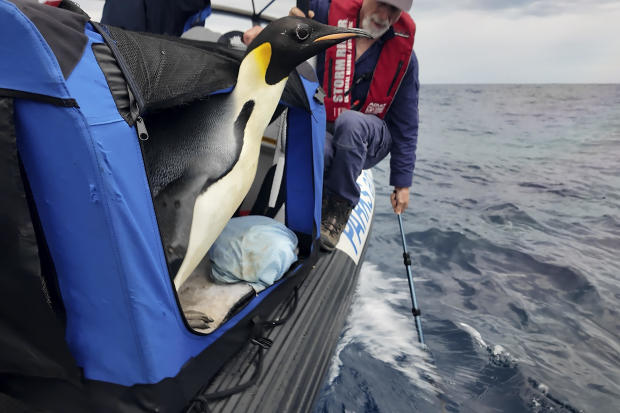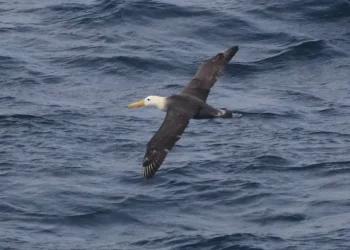Emperor Penguin “Gus” Makes a Remarkable Recovery After Stranding in Australia
Melbourne, Australia — A lone emperor penguin named “Gus,” who made an extraordinary swim from Antarctica to Australia, was released back into the ocean after 20 days of care and rehabilitation. Gus was discovered on November 1 on Ocean Beach, located in Denmark, Western Australia, roughly 2,200 miles from the icy Antarctic waters.
Gus’s recovery was overseen by registered wildlife caregiver Carol Biddulph, who named him after Augustus, the first Roman emperor. When he was found, Gus was severely undernourished, weighing only 47 pounds—far below the healthy weight of over 100 pounds for adult male emperor penguins.
“I honestly didn’t know if he would make it at first because he was so undernourished,” Biddulph shared in a government-released video before Gus’s release. “I’ll miss Gus. It’s been an incredible experience.”
Mirrors: Key to Gus’s Recovery
During his rehabilitation, Gus’s social nature as a penguin was taken into account. Biddulph used a large mirror to provide Gus with a sense of companionship.
“He absolutely loves his big mirror. It’s been crucial for his well-being. These birds are incredibly social, and he stood next to it most of the time,” she explained.
With proper care, Gus gained weight, reaching 54 pounds before being released into the Southern Ocean from a Parks and Wildlife Service boat. The exact release location wasn’t disclosed, but the boat traveled several hours from Albany, Western Australia’s southernmost city.
Rare Visit to Australia
Emperor penguins, the largest of their kind, are rarely spotted in Australia. University of Western Australia research fellow Belinda Cannell noted that while some emperor penguins have reached New Zealand, Australia had no previous recorded sightings of the species.
Emperor penguins are known to travel long distances, sometimes covering over 1,000 miles on foraging trips that can last up to a month. Gus’s journey, however, is extraordinary and highlights the unpredictable behavior of wildlife in changing climates.
Climate Change and Emperor Penguins
Emperor penguins are increasingly at risk due to climate change. Rising ocean temperatures and diminishing Antarctic sea ice threaten their breeding grounds.
According to the World Wildlife Fund (WWF), nearly 75% of emperor penguin breeding colonies are vulnerable to changes in sea ice cover, which has become increasingly erratic. Emperor penguins rely on stable sea ice for breeding and raising their young.
“If they arrive for the breeding season and the ice isn’t there, they have nowhere to breed,” said Dr. Birgitte McDonald, an ecologist at the Moss Landing Marine Laboratories.
A recent Cambridge University study published in Science News revealed that melting sea ice in certain regions of Antarctica is occurring earlier than usual, putting emperor penguin chicks at significant risk.
A Triumphant Return
With summer approaching in the Southern Hemisphere, officials prioritized Gus’s release, ensuring he could return to the ocean and regulate his body temperature naturally.
Gus’s journey serves as a reminder of the resilience of wildlife and the importance of conservation efforts to address the impact of climate change on vulnerable species.
This article was rewritten by JournosNews.com based on verified reporting from trusted sources. The content has been independently reviewed, fact-checked, and edited for accuracy, neutrality, tone, and global readability in accordance with Google News and AdSense standards.
All opinions, quotes, or statements from contributors, experts, or sourced organizations do not necessarily reflect the views of JournosNews.com. JournosNews.com maintains full editorial independence from any external funders, sponsors, or organizations.
Stay informed with JournosNews.com — your trusted source for verified global reporting and in-depth analysis. Follow us on Google News, BlueSky, and X for real-time updates.













